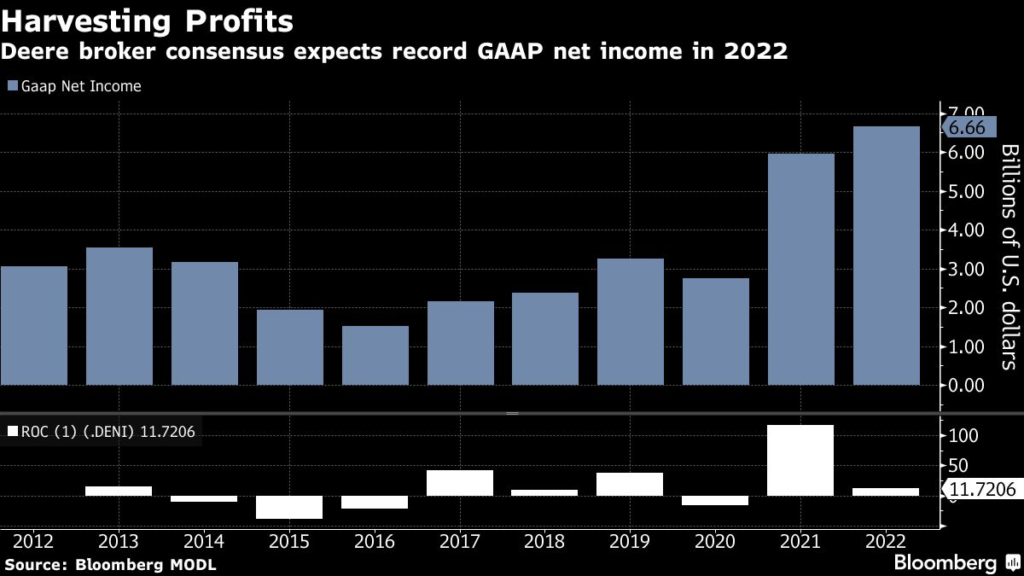(Bloomberg) — Deere & Co.’s financial outlook for the next year signals that global supply chain delays and higher labor costs following a month-long strike in the U.S. won’t significantly dent profits at the world’s largest farm equipment maker.
Deere expects record net income for fiscal 2022 of between $6.5 billion and $7 billion, compared to the average estimate of $6.66 billion by 17 analysts, the Moline, Illinois-based company said Wednesday in a statement. The tractor maker posted fourth-quarter profit that topped analysts’ estimates, though revenue for the period fell short of expectations for the first time in more than two years.
“Looking ahead, we expect demand for farm and construction equipment to continue benefiting from positive fundamentals, including favorable crop prices, economic growth, and increased investment in infrastructure,” Chief Executive Officer John May said in the statement. “At the same time, we anticipate supply-chain pressures will continue to pose challenges in our industries.”
Shares rose as much as 7.3%, the biggest gain in more than nine months.
The company’s upbeat outlook comes despite the work stoppage that slowed Deere’s factory output of equipment ranging from tractors and combines to sprayers and more in the U.S. during the busiest farming season of the year. Workers initially rejected two labor contracts that left customers waiting weeks for parts and components that normally take a couple days to deliver, before finally approving a third deal a week ago.
Deere warned investors during an earnings call that impacts from its now-settled U.S. strike will hamper farm equipment production into the new year. While margins at affected plants during the fiscal first quarter will lag the broader businesses, the company said it expects that price hikes will begin to offset cost increases by the second quarter.
The work stoppage situation had grown increasingly difficult for Deere, which sent software engineers and developers to help keep factories running, and had even asked for more to volunteer in case striking workers rejected another contract. Shares for the company are up more than 40% from a year ago, rising alongside surging demand for commodities in general.
Net income for fiscal 2021 reached $5.96 billion, its highest ever. Record earnings were part of the reason employees went on strike, arguing that they risked their lives as “essential” workers during the pandemic, and that they had worked with the company to take pay cuts in prior contracts when times were leaner for John Deere’s profits.
“This was a very solid quarter, when you consider the challenges Deere faced,” Matt Arnold, an analyst at Edward Jones, said in an email. “The company navigated a labor strike and significant cost inflation due to the supply chain issues across the economy, and still grew earnings over 70%.”
Ongoing supply chain disruptions, rising raw material costs, about a $3.5 billion rise in labor costs on the new deal and a slowdown at factories due to the strike are some remaining hurdles Deere must navigate in the months ahead. The company likely will have to raise prices on its equipment by about 1.5% to fully offset the increase in labor costs, according to analysts at JPMorgan.
Still, strong demand for crops such as corn, soybeans and wheat is driving agriculture prices to the highest in years, padding the pockets of farmers who are eager to buy new equipment to keep pace with growing consumer needs.
(Updates shares and adds details in 6th and 7th graphs)
More stories like this are available on bloomberg.com
©2021 Bloomberg L.P.











